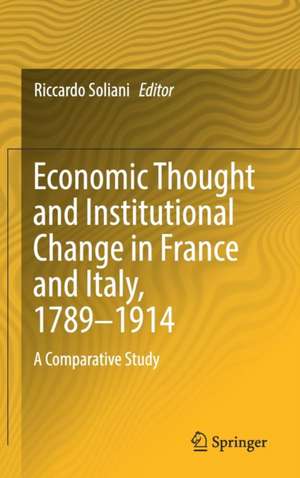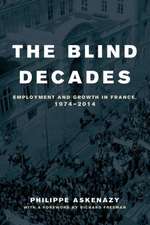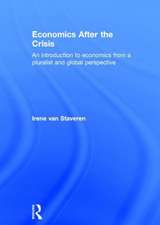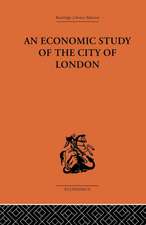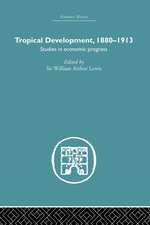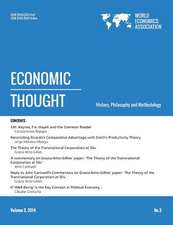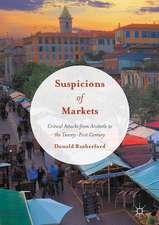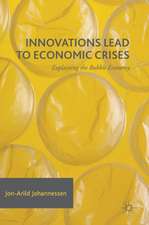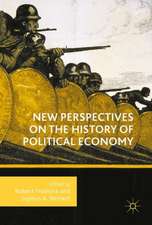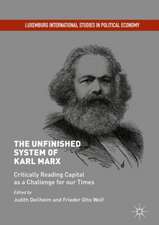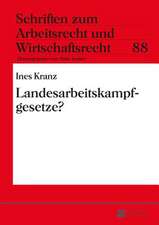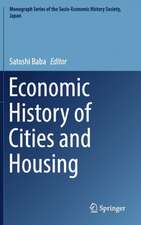Economic Thought and Institutional Change in France and Italy, 1789–1914: A Comparative Study
Editat de Riccardo Solianien Limba Engleză Hardback – 22 noi 2016
| Toate formatele și edițiile | Preț | Express |
|---|---|---|
| Paperback (1) | 637.28 lei 6-8 săpt. | |
| Springer International Publishing – 28 apr 2018 | 637.28 lei 6-8 săpt. | |
| Hardback (1) | 893.05 lei 6-8 săpt. | |
| Springer International Publishing – 22 noi 2016 | 893.05 lei 6-8 săpt. |
Preț: 893.05 lei
Preț vechi: 1089.08 lei
-18% Nou
Puncte Express: 1340
Preț estimativ în valută:
170.89€ • 178.87$ • 142.23£
170.89€ • 178.87$ • 142.23£
Carte tipărită la comandă
Livrare economică 31 martie-14 aprilie
Preluare comenzi: 021 569.72.76
Specificații
ISBN-13: 9783319253534
ISBN-10: 3319253530
Pagini: 345
Ilustrații: X, 221 p. 1 illus. in color.
Dimensiuni: 155 x 235 x 14 mm
Greutate: 0.5 kg
Ediția:1st ed. 2017
Editura: Springer International Publishing
Colecția Springer
Locul publicării:Cham, Switzerland
ISBN-10: 3319253530
Pagini: 345
Ilustrații: X, 221 p. 1 illus. in color.
Dimensiuni: 155 x 235 x 14 mm
Greutate: 0.5 kg
Ediția:1st ed. 2017
Editura: Springer International Publishing
Colecția Springer
Locul publicării:Cham, Switzerland
Cuprins
Part I Fighting for identity, justice and liberty.- Economics and “civilization” in Gian Domenico Romagnosi (Edoardo Ciech, Riccardo Soliani).- Carlo Cattaneo (1801‐1869), Lombard philosopher and economist, liberal beyond federalism (Enrico Ivaldi, Riccardo Soliani, Andrea Repetto).- Liberty, labour and human rights: institutional change and the intellectual debate on slavery in France from Condorcet to the mid-19th century (Simona Pisanelli).- Part II Economic freedom, free trade and equity.- Whose Sismondi? Which Italy? The Reception Italy Gave Sismondi's Economic Thought (Letizia Pagliai).- A comparative analysis of the relationship between Friedrich List and French and Italian culture (Stefano Spalletti).- J.-B. Say: political economy and social justice (Riccardo Soliani).- Pellegrino Rossi: A new approach to liberalism (Joël-Thomas Ravix).- Part III Liberalism and its alternatives in various declinations.- From the people to the Industrialists: Saint-Simon and the eclipse of sovereignty (Simona Gregori).- Institutions and development in saint-simonian political economy (Abdallah Zouache).- An economic philosophy for the Republic: Elie Halévy, Alain, André Maurois (Ludovic Frobert).- Economics and Sociology meet Socialism: Sombart, Durkheim and Pareto (Vitantonio Gioia).
Notă biografică
Riccardo Soliani is Associate Professor in the History of Economic Thought and Macroeconomics at the School of Social Sciences – Department of Political Science, University of Genoa, Italy. He is a member of the Scientific Council of the Association Charles Gide pour l'étude de la pensée économique. His main fields of research are the history of economic thought in Continental Europe in the eighteenth and nineteenth centuries and postkeynesian economics.
Textul de pe ultima copertă
This book explores the relationship between economic thought, proposals for reform of political institutions, and civil society in the period between the rise to power of Napoleon and the eve of the First World War in Italy and France – two countries with a similar cultural and political tradition and with personal mobility of the intellectual class. The first section of the book is devoted to the struggle for identity, justice, and liberty, including its economic dimensions. The relation between political and economic freedom and its effect on equity is then addressed in detail, and the third, concluding section focuses on the intellectual and political conflict between the social visions of liberalism and socialism in some of their various forms, again with consideration of the economic implications. The comparative nature of the analysis, combined with its interdisciplinary approach to the history of economic and political thought and social history, will enable the reader to understand more clearly the historical evolution of each country and the relevant contemporary political and economic issues.
Caracteristici
Provides an authoritative account of intellectual, political, and economic developments in Italy and France Offers a comparative and interdisciplinary approach that casts fresh light on the historical evolution of each country Thoroughly discusses themes such as national identity, social justice, economic freedom, and alternatives to the market economy Includes supplementary material: sn.pub/extras
